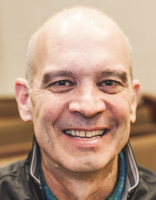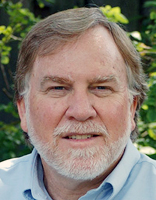 The absence of a personal touch in ministry amid COVID-19 lockdowns, limited seating, and separation from parishioners is leading some pastors to experience what has been dubbed “pastor separation syndrome.” In addition to physical separation from their congregations, the phrase reflects the exhaustion many pastors are feeling from a dramatically increased phone and Zoom-based ministry, such as conducting virtual-only worship and Bible studies.
The absence of a personal touch in ministry amid COVID-19 lockdowns, limited seating, and separation from parishioners is leading some pastors to experience what has been dubbed “pastor separation syndrome.” In addition to physical separation from their congregations, the phrase reflects the exhaustion many pastors are feeling from a dramatically increased phone and Zoom-based ministry, such as conducting virtual-only worship and Bible studies.
EPC Stated Clerk-elect Dean Weaver, who for 15 years was Lead Pastor of Memorial Park Presbyterian Church in suburban Pittsburgh, said the past year “was in many ways my most challenging year of ministry as a pastor. In 35 years of pastoral ministry, I have never experienced anything like it.”
“Many EPC pastors I’ve connected with admitted that they are exhausted, and they see no end in sight,” said Jeff Jeremiah, EPC Stated Clerk. “Many have also expressed a sense of uncertainty about the future that’s unsettling. Some are wondering about their call to ministry in general, or to the specific church they currently serve. I’ve lost count of how many told me that they are a ‘people person’ and miss being face-to-face with people.”
Wade Brown echoes Jeremiah’s experience. Brown serves as the Regional Executive Director for PastorServe’s Rocky Mountain Team. PastorServe is a partner ministry of the EPC and specializes in coaching and crisis support for pastors. He said that many of the pastors with whom his team has counseled over the past year have lamented the lack of in-person ministry during the pandemic.

Wade Brown
“We’ve been around over 20 years, and like the insurance commercial says, ‘we know a thing or two because we’ve seen a thing or two,’” he said. “Pastor separation syndrome is one of the things we’ve observed pastors struggling with during this pandemic.”
‘Virtual fatigue’
Brown said stories “tend to come in sound bites” during coaching and care conversations with pastors.
“Pastors have said things like, ‘I miss being with my people in person,’ ‘Zooming with someone is better than a phone call, but it’s not as meaningful as being with someone in person,’ ‘I long to look people in the eyes again and pray for them in light of their pain and difficulties,’ and ‘Preaching to a camera is not the same as preaching to people in person, where I was able to pause and lean into the pastoral moments during my sermon and linger a moment or two as I had eye contact with people,’” he noted.
Another EPC ministry partner is Pastor-in-Residence (PIR) Ministries, which specializes in pastoral coaching and ministering to church leaders in transition. Roy Yanke, PIR Executive Director and Transitional Pastor for Grace Chapel EPC in Farmington Hills, Mich., said pastors he has talked to are learning to adapt to the challenges brought on by the pandemic, but long for a return to in-person ministry.

Roy Yanke
“In the beginning of the pandemic, everyone was scrambling to figure out how to endure the lockdowns and get online,” he said. “The stories we heard were mostly frustration and a weariness from having to become not only pastors but tech gurus.”
Yanke added that as the pandemic has continued during a season of political unrest, many pastors have experienced their ministry morphing into that of peacemaker.
“Some are being peacekeepers, and they are finding it very wearying to be that—to just try to keep everybody happy,” Yanke noted. “Because people are not happy, no matter which side you fall on in terms of restrictions and point of view on all of this. It’s a no-win situation.”
Jeremiah added that several pastors he has talked with told him something like, “No matter what I do on any issue I will get vocal opposition in the congregation—and often in my Session.”
Weaver noted that many pastors are simply not used to making so many quick and essential decisions in such a small space of time.
“It seems that no matter how hard we worked at getting the best information—which was constantly changing—and get the most possible input, we found ourselves making decisions that we knew would upset one part of our congregation or another. Or both,” he said.
The struggle is real
Brown said he tells pastors dealing with obstacles in ministering to their congregants during this time that “it’s not their fault. There is no guilt or shame in this.” He recommends focusing on using the tools at hand to make connections.
“We encourage them to continue taking advantage of the pathways that are available to them such as calls, social media, videos, Zoom, etc.,” he said. “Many pastors are optimizing the power of small groups in this season. People are learning to shepherd, encourage, and be there for one another in deep, meaningful ways through small groups. Clearly, this type of ministry brings Ephesians 4:11-13 to life for pastors.”
Yanke said a pastor he is counseling told him that the pandemic has resulted in the normal weight of everyday ministry now being “on steroids.”
“They have their own personal expectations about what their ministry should look like,” Yanke said, “and are trying to make that work in the current situation with the restrictions and the current limitations they are facing. And that, coupled with having to deal with the expectations of people, is making their ministry more challenging.”
He added that in many cases, the expectation of personal visitation in homes has changed dramatically during the pandemic—with some parishioners still having that expectation.
“It’s like during COVID a pastor getting grief about why they weren’t personally visiting people in their homes,” he said. “It’s a no-win situation. They want to do that. They want to continue to have that influence in the lives of their people. But it isn’t just a matter of them analyzing their own level of risk, but understanding if they do that, they could be putting other people at risk. So you’ve just got to weigh that. It’s a real challenge for them.”
Take time to recharge
Brown suggests that pastors facing varying degrees of loneliness and frustration after months of pandemic-induced physical separation from their congregations take time to pay attention to the health of their own souls—which oftentimes is neglected even in normal circumstances.
“Crisis has a way of exposing things in us: fractures in our relationships, our marriages, the state of our spiritual health,” Brown said. “Crisis exposes our heart-idols of power, approval, security, and comfort.”
He added that in “countless conversations” over the past year, pastors are “more than willing” to address that topic.
“We believe God is using this season of the pandemic to get our attention and bring us to a place of greater desperation for His intervention. If pastors will pay attention and seek to steward this season of spiritual formation well, we believe they’ll be in a better place to serve their people because they’ll be healthier as Christ-followers, leaders, and shepherds when the pandemic-induced physical separation is over,” Brown noted. “Having said all this, I’d encourage pastors to initiate. Connect with other pastors. Pray for one another. Encourage one another.”
Yanke emphasized that pastors may find comfort in falling back on some of the “tried and true” methods of ministry that can help alleviate “virtual fatigue” of Zoom meetings and Bible studies, as well as other online-only activities.
“Hands-on, personal, across-the-table kind of connections is woven into what ministry is all about,” he said. He added that “putting pen to paper” by writing a personal note or making a quick phone call can not only be good for a pastor but communicates the pastor made a physical effort to communicate personally with a church member.
“It also can open a door to two-way communication.”
Available resources
PastorServe and PIR Ministries are recommended resources of the EPC Ministerial Vocation Committee.
PastorServe specializes in coaching and crisis support for pastors. For more information, visit www.pastorserve.net or call 877-918-4746.
PIR Ministries specializes in pastors in transition, especially those in forced exits, as well as coaching and placing interims. For more information, visit www.pirministries.org or call 844-585-1234. Numerous free resources are available on their website at www.pirministries.org/resources, including podcasts, video archives, blogs, and helpful articles.
